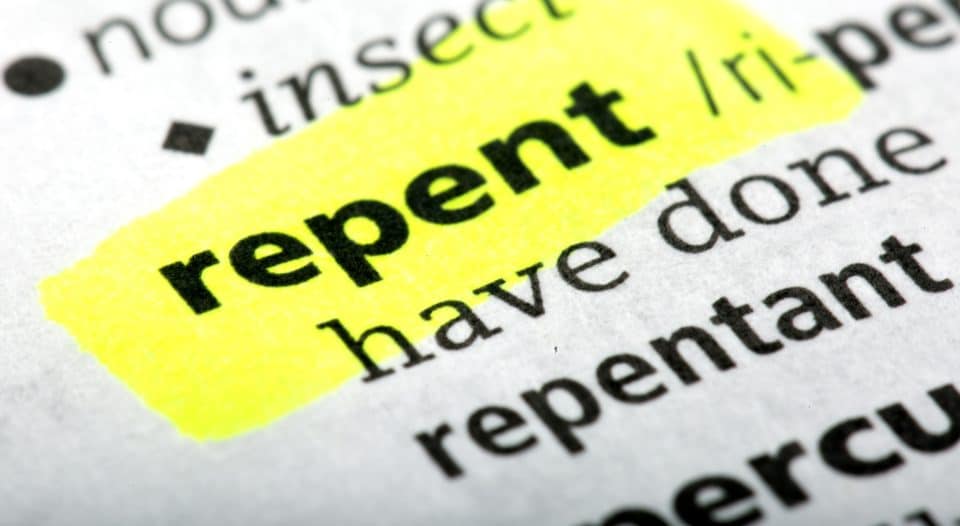A saying often surfaces when someone first encounters and confronts abolitionism: “I’ve always been an abolitionist; I just didn’t know it.”
At first glance, this statement may seem positive, suggesting a new realization and alignment with what is universally recognized as biblical justice. It often becomes a way to avoid the deep, uncomfortable burden that true repentance requires. Rather than confronting and confessing their prior indifference and neglect toward the immense suffering and dire plight of the preborn, many try to reinterpret or downplay their previous lack of awareness. This is often rooted in ignorance or a lack of familiarity with the cause, rather than acknowledging it for what it truly was—a sinful disregard for a grave moral issue.
Such a reaction can be understood as an attempt at course correction—one that seeks to avoid the essential act of confession by reinterpreting and reframing the past, rather than confronting it directly and truthfully. However, Scripture is clear and unambiguous on this critical matter: God calls us to genuine and heartfelt repentance, not to mere rebranding or reinterpretation of our past actions and attitudes. Such attempts prove to be a shallow and ineffective substitute for true repentance.
If you want to identify as an abolitionist, you must do the work. This work goes far beyond simply protesting abortion. It involves much more than holding a certain position, adopting a specific attitude, or taking a particular stance. It requires a deep awareness, a full understanding, and a profound recognition of the far-reaching consequences such a position entails. It begins, most importantly, with biblical knowledge and a healthy fear of God, who deems abortion an abomination.
“There are six things that the Lord hates, seven that are an abomination to him: haughty eyes, a lying tongue, and hands that shed innocent blood.” — Proverbs 6:16-17 (ESV)
Abortion, as defined by God, is the shedding of innocent blood—the murder of the most vulnerable. Scripture is clear that such actions are not just sinful, but an abomination before the Lord.
Abolitionism is a living, vibrant, and powerful movement firmly rooted in theological doctrine, based on the understanding that abortion is, in fact, an act of murder. It recognizes that striving for justice demands the immediate removal of this practice from society. Grounded in the values and principles of the gospel, abolitionism is unwavering in its core beliefs, driven by a moral urgency to confront and challenge the wrongs present in our world, all deeply rooted in God’s Word.
We must acknowledge and admit a reality that must not be downplayed. Many who claim to stand with abolitionists today are hiding a secret: They have previously supported incremental pro-life legislation or, worse, have opted out entirely from the ongoing efforts to uphold the sanctity of life. This is an undeniable fact, and such a stance is not a positive one. The lies of the pro-life establishment are persistent and cling to the deceiving heart; however, this position fails to challenge the issues in a way that aligns with the foundational values of abolitionism. If we were not actively working for abolition, we are guilty of apathy.
It is not enough to look back and say, “I just didn’t know.” We must look back and say, “I should have known. I should have acted. Lord, forgive me.”
Course correction in abolitionism involves reframing how we understand our past failures. It’s not a matter of ignorance but rather of acknowledging that what we did—or failed to do—was wrong. Instead of saying, “I did not care about the suffering of my unborn neighbors,” one might say, “I’ve always been an abolitionist; I just didn’t know it.”
Changing the way we speak may help avoid the discomfort of facing our past, but it doesn’t bring real change. True change requires more than altering language; it requires repentance—acknowledging that our past actions were sinful, seeking forgiveness, and turning away from our apathy to actively engage in the work of abolition.
Without repentance, course correction becomes a way to feel better about ourselves without actually doing what’s right.
Scripture teaches that true repentance is demonstrated through action: “Bear fruit in keeping with repentance” (Matthew 3:8). Acknowledging our past failures isn’t about wallowing in guilt—it’s about forsaking apathy and moving forward in obedience.
For those who recognize their apathy in the fight against child sacrifice, repentance will lead to:
1. A Changed Mindset: Abortion is no longer just a political issue; it is an intolerable and urgent wrong that demands immediate action. It is not merely a tragic reality of our time, but a profound moral injustice that must be confronted with a commitment to justice. Abolitionism requires a radical shift in how we view this issue—not as something to be managed or minimized, but as a sin that must be completely abolished.
2. Active Engagement: True abolitionism goes beyond mere mental agreement; it requires tangible steps and real action. It’s about moving past agreement in principle and actively engaging through public evangelism, mobilizing the church, or supporting abolition legislation. Real abolitionism is about activity. If we have repented for our inactivity in the past, we must manifest that repentance through activity in the cause. Whatever it takes—engagement with abolition groups in your community, sidewalk counseling, or legislative lobbying for equal justice and equal protection—we must demonstrate our faith and obedience to God through concrete actions.
3. Uncompromising Advocacy: We must reject any exceptions, incrementalism, and partiality in abortion, because delayed justice is denied justice. Many who have long considered themselves part of the pro-life movement will come to realize that incremental legislation is inherently unjust. Yet, in earnest repentance, we must reject such accommodations and instead promote the full and immediate abolition of abortion. This will require a firm stand against the temptation to support legislation that restricts abortion without criminalizing the act of child sacrifice.
4. A Willingness to Call Others to Repentance: Encouraging fellow believers to acknowledge and confront their past complacency is not a work of condemnation, but a positive challenge to rally more saints to the vital cause of abolition. Just as we are called to repent and bear fruit in our lives, we must also call others to join us in this work. This means gently but firmly confronting those in the church who prefer passivity and accommodation over holiness in life and doctrine. It means holding church leaders accountable for preaching not just about the sin of abortion, but specifically against it. It also means urging fellow believers to move beyond mere anti-abortion sentiment and become actively involved in the abolition of abortion.
Encouragement for the Journey
Recognizing and acknowledging our failures in the past must not drive us into a deep pit of hope and despair but must ignite in us a heart full of joy through genuine repentance, and, in the long run, glorify God in all its fullness. God longs to grant forgiveness and acceptance to all who seek Him with a humble and truthful heart. There is forgiveness even for those who have aborted their own children and now bear shame. God eliminates their shame and guilt by bringing peace by repentance through his Son. But we must openly admit that we have been indifferent and apathetic toward image bearers. The true shame lies not in acknowledging our failures, but in failing to change—choosing to remain idle and inactive when confronted with a reality that can no longer be ignored or overlooked.
Rather than saying, “I have always been an abolitionist,” we should say with integrity, “I have, in the past, been indifferent and apathetic toward the murder of children, but at long last God has opened my eyes to the reality surrounding me. I’ve kept my voice and mind quiet too long but no more! I will act, I will fight, I will seek to glorify God through the immediate and uncompromising abolition of abortion!”
The fight we wage is real and constant—present now and in times to come. Where and what we stand against now is paramount, and it deserves our undistracted and wholehearted attention. Let us not mask our indifferent past with flattery or shallow apologies, but confront it directly with genuine repentance and a heart that earnestly desires to obey.
Will you make that first move in committing yourself to abolition? That is a matter resting in your conscience alone. But remember: To whom much is given, much will surely be demanded (Luke 12:48). In the present, we must bear fruit that reflects true repentance. Let us move forward, free from excuses, not burdened with defenses, but with hearts transformed and firmly committed to loyal submission to Jesus Christ our King.
As a post-abortive father, Justin Weidman found redemption and forgiveness in his Savior Jesus Christ. Through the Gospel and Abolitionists Rising, he embraced immediate and uncompromising abolition. Justin is a signer of the Norman Statement.





